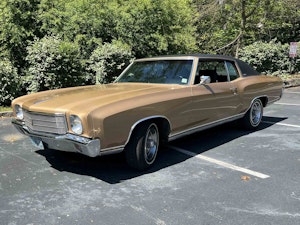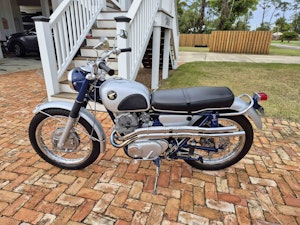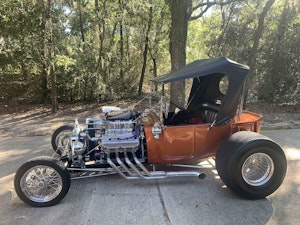Media | Articles
Car people are lying to you about their budgets, and I have the receipts
If you want to see a car person squirm, ask them how much they’ve spent on their car. Most of us don’t have the number handy. If we do, we are lying about it. I know this because I am guilty. There has long been a number in my head totaling the money I’ve invested in my ’65 Corvair Corsa over the last six years. After saying that figure out loud to a friend the other day, I decided to check myself.
I was off by about 30 percent.
Could it be because we tell ourselves that $5 here and $100 there doesn’t add up across paychecks? We are likely all guilty of some “creative accounting” when it comes to our project cars, and I hold myself as example number one. We apply this to other people’s cars, too.
Last weekend, David Freiburger listed his 1969 Ford Mustang Mach 1, better known as “Disgustang,” for sale on Facebook, asking $75K. My first reaction was surprise at the fact that he was selling it publicly. The second was confusion—by listing it on Facebook, he was probably losing money. (He could likely get more on Bring a Trailer. Clearly, he wanted it to go to a fan.) Even if he was being helped by sponsorships, Freiburger has a lot of dough tied up in that car. Anyone could find the parts list by reviewing dozens of episodes from the three different video series he leads.
When you want OEM+ looks and effective air-conditioning, you don’t have many choices. Freiburger didn’t even try to hide the cash he put in: The front drive alone for the built Ford small-block under the hood was $3000. Then there was a set of Air Flow Research cylinder heads, and hours of tuning to make the car ready to drive daily—and comfortably, at that.
Marketplace
Buy and sell classics with confidence
Despite the handle, Disgustang is a true restomod that puts modern function into a beautiful vintage wrapper. The design brief never included the word budget.
And yet a dozen comments on his post railed that Freiburger was taking advantage of people: “You got those parts for free.” “You got paid to install them.” “I could build the same thing in my garage for $15K.”
Freiburger laughed in the faces of a few commenters, and rightfully so, but I can see both sides. He is not completely off the hook. The brand in which he has so carefully wrapped himself centers on labeling project vehicles as “junk,” and rescuing such “garbage” by doing the right thing the wrong way. If you’ve paid attention, you’ve seen that while his schtick has remained consistent, the ambition of the projects he undertakes and the level of polish on the resulting builds has steadily risen.
Lots of fans didn’t catch the point when the Disgustang’s ratty look became only that. Everything not cosmetic was redone, and a bunch of carefully selected mechanical upgrades were installed. The shift didn’t click for me until I saw the for-sale listing.
We didn’t realize how much Freiburger had invested in that car because we often fail to acknowledge how much time and money we have invested in our own cars. Those who label his Mustang a $15K car are the same people still spouting off about sub-$1000 LS swaps. I mean, technically an LS swap that cheap is possible; but is that level of hackery really what you want to spend your limited amount of time doing? Why not just do it right?
Owning vintage cars is not cheap. If you think it is, you have been at this a long time.
Experience allows for creative accounting. A part or piece “just sitting on the shelf” often didn’t get there for free; yet you’ll pull it from storage and install it on your project with a zero next to it on your mental balance sheet. Look no further than a drawer of specialty tools in the tool chest of your favorite veteran wrencher. The first time they used those tools, the thought of their cost probably hurt. After two decades, suddenly that tool is basically free. It’s been paid off and costs nothing to keep. It has value, but the act of using it rarely triggers a thought of the original receipt.
Creative accounting isn’t limited to dollars and cents; it applies to time as well. A 15 minute job for you or I is a solid hour or possibly an entire evening for someone new to that same project. Experience creates efficiency, which we can leverage into value. Did you buy a project off Facebook Marketplace, something the last person gave up on, because you knew it would only take you an hour to rebuild the fuel system? That’s creative accounting. So many of us value our time at zero—or somehow less than that—but opportunity cost is real.
It’s easy to become jaded and thus unwelcoming when talking to those with less time invested in cars or their maintenance. We convince people that things are easy when in fact they are not, yet act surprised when newcomers are put off by the time, money, and emotional investment required to do things “right.”
The fact of the matter is next to nothing pertaining to our old cars is approachable, easy, or cheap. That’s not a good thing, or a bad thing, but it is a fact. The moment we stop lying to ourselves and accept this, the entirety of our hobby—and all the people on its sidelines—come into focus.
Some of us are good at finding and taking advantage of deals. Others use creative accounting. Regardless, we often end up with way more money tied up in our projects than we realize. I’m not calling for everyone at a cruise night to have a window sticker that says how much money they have tied up in their car—though I have seen it. I’m just asking that when people who are new to the hobby ask how much a build costs, we be honest. Nothing is more frustrating than getting excited about building a cool car for $5000 only to find out there is no way you can afford it.
Normalize being honest, and ditch the flair of “I did X or Y for so cheap!” Such a claim can be impressive, but it is more often disingenuous and makes us all look like liars who squirm when asked about specifics.
I suggest a rock-solid “I love this car enough that I don’t keep track. The car matters more than the money.”
That’s the truth, right?
***
Check out the Hagerty Media homepage so you don’t miss a single story, or better yet, bookmark it. To get our best stories delivered right to your inbox, subscribe to our newsletters.











Restoration Accounting is easy: double your memory, then round up another $10,000, haha…
I only keep a rough mental tally on my projects, largely because it’s more about the project than the budget, and I’m in this deal for fun, not angst. I just keep an eye on the rest of my “life budget”, so I don’t bankrupt myself. FWIW, I’ve never been a wealthy person, but I have a pretty simple & low-buck lifestyle outside of the car stuff.
As for Freiburger’s Mustang, I don’t care if he got comped for everything – it’s worth what it’s worth.
I have manila envelopes stuffed with receipts for each respective vehicle I own, and a few that I no longer own so accurate numbers are readily available should I choose to look. What I consistently discount is the value of my time. “Eh – $40 muffler plus half a day to fit it in and quiet = $40″…I routinely screw myself on my hourly rate.
I’m rebuilding a Lotus that I’ve had since the 80’s. Everything is there, it just needs refurbishing. I have a separate checking account that I only use for the Lotus and so I have a great idea as to what I’ve spent. My budget is $10k (parts only, not time, since I’m doing the work myself), and I still hope to get close to that. But I do know that when the cash run out, I’ll just add more!
I’m a retired design engineer and over my career I’ve learned that everything takes longer, and costs more than you expected. EVERYTHING!
I’ve been fairly accurate on my estimates for my british iron restorations, Sprites, and TRs, but now I’m doing a Lotus Elite type 14. Prices are about double what I expect, and there is only one vendor in England, no less. The only plus is that it could be worth when I’m done 3x what the others sold for.
A bit of tempering needs to be applied here. I don’t know of anyone (excluding Foose, Kendig or Leno) that pays themselves to work on their own vehicles. Our personal time is only worth what we enjoy doing and putting a dollar amount on that is extremely subjective. How many of us do what we do while thinking about how much our time is worth? If we don’t want to perform a particular task, we pay someone else to do it. If doing something involving our vehicles doesn’t require a physical cash outlay, then we can call that job a freebie. Parts are a different matter, because somebody at sometime paid something for them. And in the end, does it matter? The important thing is we enjoy what we do as long as we can. “You can’t put a price on a good time.”
I made the mistake of giving every car a category in Quicken, those categories date back to the late 1990’s when I was using Managing your money. Lets just say that I have looked, I can see all the cars, and the front runners in cost are not the toys. I was amazed at how much I spent to get my wife and kid around safely, getting me to and from work wasn’t cheap either. I will admit that Gas is lumped into one category that is actually less than expected.
Yes, the cost of my labor is figured at $0. I couldn’t afford me otherwise!
I have the receipts in my file cabinet. I have not totaled them up. I’m sure it’s more than I think. It’s mostly the maintenance stuff of tires I bet.
I prefer to buy low and spend low on improvments. I can do 99.99% of the work myself and am happy using tried and true technology instead of clamoring after the latesest trendy parts.
My cars aren’t perfect, but they are all reliable. I don’t follow the ‘Experts’ who chase values, because none of my cars are for sale.
I owned boats in the 70’s and 80’s. Same arguments, “How much did those fish you caught cost”? If you have to ask, you don’t get it. Now I own a ’66 Beetle for a daily driver and I could have bought 10 of these in 1966 for what I have in it. But who cares, not me? It’s not an investment, it’s just fun!
I find Freiberger a very engaging personality. I catch Engine Masters whenever I can, because I’m just blown away by the amount of knowledge in that dyno room. That said, I hate ROADKILL. Why? Because it’s fake. Nobody builds a car in 72 hours. No one has an automotive Wal-Mart in their backyard. No one has the cell phone numbers of the entire hobby in their back pocket. Yet, with all that, the projects cost more, and perform more poorly than they should. They bounce around so much you never see a project evolve.
And I’m sick to death of “fauxtina”. If you dropped over 75 k on a Mustang, you coulda painted it. Ditto blown hemi 55 Chevies. It wouldn’t be any less period finished properly.
Let’s not forget the message to aspiring hot rodders. Running a car on the highway using hose and a fuel can is nothing anyone should emulate. There ‘s also the matter of unsafe/illegal cars operated on the street. Could the 390 in that Galaxy have been saved? Maybe if had been awakened properly
Finally, can the powers that be just kill Motor Trend? The empire the talent the audience are pure Hot Rod. The Motor Trnd brand is a dead rag walking. Essentially it’s been reduced to a puff piece for electric cars.
Hey, and finally a ‘thank you’ to Frieburger, Dulcich, Costa and everyone else. For all my bitching, you’ve gotten me through hours in the garage, days layed up in bed, and endless rainy/snowing mornings. At least there’s a place to get auto content 24/7
Kyle, thanks.
I have lied to myself frequently about this issue especially when I’m looking at something I want to buy. But I’ve been doing it for so long I restrain at the last moment before the dive and face the truth (the bull) and make a decision. What generally happens is there’s always a Turkey in there somewhere that needs repair
and there goes the number that was in my head at purchase. Or the famous Why Don’t I (we) Do This?……….
Great story, Kyle–I always enjoy your writing, and we share Corvair ownership in common, though mine was spectacularly ill-advised. Whenever my wife and I argue, she can call a quick end to it by simply chanting “Corvair! Corvair! Corvair!” until I concede defeat.
I have long since stopped calculating the cost of the car I build, a habit I dropped during the 14 years I built and tracked a 944S2, which started as a street car and morphed into a stripped, caged beast powered by a built-to-the-hilt 968 engine. Over dozens of track days on multiple tracks we towed it to, that car was driven by my daughter and me, during which it ate epic mountains of cash. I don’t know how much it cost, and I don’t care.
Enjoyed the article. Literally picked up my car from the shop this morning. Had some patches welded in which is something I can’t do. Can take care of pretty much all the rest of the maintenance on my 1973 Saab 96. There is no way I would keep track of all the receipts as this is more therapy than anything else. I do find it easy to trade services with other people. For the welding I showed a friend how mechanics liens work, and did some little legal work in exchange for the welding. I will still dress it down put seam sealer in just to cover some of the areas and paint.
It’s been great. Doing this with my son, and if I started to think about this, in terms of money, I would never do it. In the end, doing all the work, myself, having a parts car, and trading out for other work, I know that I will still have more in the car than it will ever be worth, but is it worth it? Absolutely. I would spend more money on other hobbies and not have developed these skills. Gets me away from sitting behind a desk.
My son and I have about 4-8 project cars/ builds going at any one time. He gets mad (or laughs more likely) as as I account for every penny spent on each car. I have done this later in life as I am now so curious what it “actually costs”. Plate registration, $2.99 fix-it part, pick-n-pull odds and ends – all of it gets written down in my black daytimer – a page or two for each project car. Then when a car moves along to someone new I know what it cost us in the end. We all know this is NOT a money making hobby so maybe you just know how much all that fun was worth in the end!